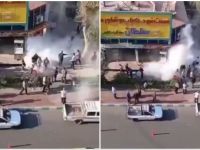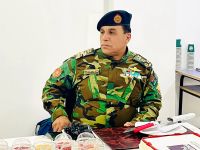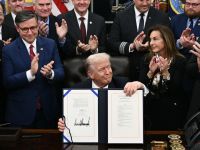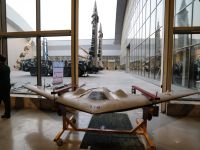Palestinian President Yasser Arafat appealed in person to the Security Council on Friday to send a UN force to protect Palestinians, but the United States said it would oppose the move without Israeli support.
The Israeli ambassador to the UN, Yehuda Lancry, met separately with the council, and told reporters he had "expressed very clearly our opposition to an international force."
Arafat, the president of the Palestinian Authority, conferred in private with ambassadors of the 15 council member states for an hour and a half in the council chamber.
He then had a short meeting with the UN deputy secretary general, Louise Frechette, before departing. He passed a phalanx of waiting reporters but did not stop to speak.
On Monday, the Palestinian Observer to the UN, Nasser Al-Kidwa, wrote to UN Secretary General Kofi Annan, asking the world body to deploy 2,000 military observers in the West Bank and Gaza Strip.
The US ambassador to the United Nations, Richard Holbrooke, told reporters that Arafat had repeated the appeal before the council.
Asked whether the United States would veto the proposal, Holbrooke noted that it had not yet been submitted as a draft resolution and that Israel had not been consulted.
"We will oppose it, unless and until it is supported by both parties in whatever form would emerge," Holbrooke said.
The United States was not opposed in principle to Palestinian suggestions, he said.
But "we are not going to support something that has been unilaterally proposed without ever having been discussed by the other side, directly," he said.
"We are in a period of extraordinary danger," Holbrooke went on, but he added that there was no alternative to peace.
"They are either going to have live together or keep killing each other. In the long run there is only one outcome, which is peace," he said.
The meetings with Arafat and Lancry coincided with another "day of rage" in the West Bank and Gaza, in which three Palestinians were shot dead and an Israeli soldier badly wounded.
The casualties have reached 200 in six weeks of violence sparked by a visit of Israeli opposition leader Ariel Sharon to the al-Aqsa mosque compound in east Jerusalem on September 28.
The French ambassador to the UN, Jean-David Levitte, suggested to the council that it mandate an unspecified number of military observers "armed only with cameras" to monitor the situation.
Diplomats said Arafat had noted "with interest" the proposal, which had British support.
But Lancry reiterated that Israel was "opposed to any bypassing of our bilateral negotiations with the Palestinians."
"We are ready to talk to the Palestinians on any pending issues," he added.
Holbrooke also insisted on the importance of resuming direct peace talks between Israelis and Palestinians.
"We want the peace process to move forward. The Sharm el-Sheikh process should be accelerated now that the fact-finding committee is in place," he said.
He added that US President Bill Clinton "will use every remaining day of his administration to further the peace process."
Annan was not present for Friday's discussions.
He was on his way from Geneva to Bahrain, where he was due to inaugurate a new office for UN agencies on Saturday, Okabe said.
Annan was due to travel to Qatar to address the opening of the summit of the Organization of the Islamic Conference on Sunday -- UNITED NATIONS (AFP)
© 2000 Al Bawaba (www.albawaba.com)







